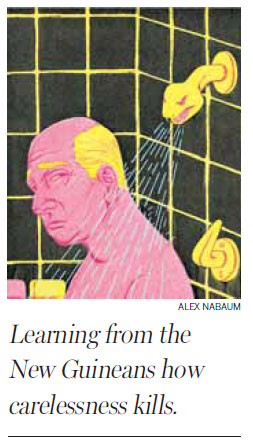That daily shower can be a killer
Updated: 2013-02-17 08:39
(The New York Times)
|
|||||||||

The other morning, I survived my daily shower.
You see, falls are a common cause of death in older people like me. I'm 75. Life expectancy for a healthy American man of my age is about 90. If I'm to live that long, that means about 15 times 365, or 5,475, more showers.
But if I were so careless that my risk of slipping in the shower each time were as high as one in 1,000, I'd die or become crippled about five times before reaching my life expectancy. I have to reduce my risk.
This calculation illustrates what I've learned from 50 years of field work on New Guinea: the importance of being attentive to low-risk but frequent hazards.
I first became aware of the New Guineans' attitude toward risk on a trip into a forest when I proposed pitching our tents under a tall and beautiful tree. To my surprise, my New Guinea friends absolutely refused. They explained that the tree was dead and might fall on us.
Yes, I had to agree, it was indeed dead. But I objected that it was so solid that it would be standing for many years. The New Guineans were unswayed.
In the following years I came to realize that every night that I camped in a New Guinea forest, I heard a tree falling. And when I did a frequency/risk calculation, I understood their point of view.
If you're a New Guinean living in the forest, and if you adopt the bad habit of sleeping under dead trees whose odds of falling on you that particular night are only one in 1,000, you'll be dead within a few years.
New Guineans' attitude toward repeated low risks is "constructive paranoia": a paranoia that actually makes sense. Now that I've adopted that attitude, it exasperates many of my American and European friends. But three of them who practice constructive paranoia themselves - a pilot of small planes, a river-raft guide and a London bobby - learned the attitude, as I did, by witnessing the deaths of careless people.

Studies have compared Americans' ranking of perceived dangers with the rankings of real dangers.
It turns out that we exaggerate the risks of events, beyond our control, that cause many deaths at once or that kill in spectacular ways - crazy gunmen, terrorists, plane crashes. But we underestimate the risks of events that we can control and of events that kill just one person in a mundane way.
I've become as constructively paranoid about showers, stepladders, and wet or uneven sidewalks as my New Guinea friends are about dead trees.
My hypervigilance doesn't paralyze me or limit my life: I don't skip my daily shower, and I keep going back to New Guinea.
The New York Times
(China Daily 02/17/2013 page11)